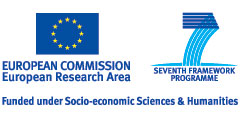Research
Eunamus explored the creation and power of European national museums. The focus was on understanding the conditions for using the past in negotiations that recreate citizenship, and on the understanding of layers of territorial belonging. The research was conducted through multi-disciplinary collaboration between eight leading university institutions. Project partners and associated researchers explored institutional path dependencies, the handling of conflicts, modes of representation, cultural policy and visitors’ experiences.
The project aimed to create a platform in an area where research so far had been scattered and fragmented. Previous research on national museums had often been based on individual case studies and often single disciplinary areas, such as art history and archaeology. This project adds value by developing a body of knowledge and expertise on the historical trajectories and contemporary complexity of national museums. Understanding the cultural force of national museums will provide citizens, professionals and policy makers with reflexive tools to better communicate and create a common understanding of diversity and community in developing cultural underpinning for democratic governance.
Objectives
The overarching objectives of Eunamus were:
- To conduct a comparative study of the formation of national museums in Europe and deliver a rich picture of national museums in all their social, political, and intellectual complicity.
- To reveal the historiographic practices that underlie national museums’ uses of the past and to understand how they mould collective sensibilities, notions of community, citizenship, and boundaries of difference.
- To examine the semiotics of national museum buildings and gathered material heritage and make visible the material culture that unites and defines European sensibilities and values.
- To interrogate the policy making and policy implementation actions of national museums and understand how these institutions have acquired their roles as social agents.
- To locate the European citizen as an active participant in the making of national museums and understand the reception of national museums.
- To facilitate for national museums to act as arenas for dialogue between European citizens about what it means to belong to a nation and to Europe.
Organisation
Eunamus activities were divided into six thematic research strands. Five of them ran in parallel with slightly staggered beginnings. There was a snowball effect built in to the work plan which permitted, with the addition of each layer, an increased understanding of national museums based on historising and comparative studies. The final study brought together the results in a comprehensive statement on how national museums can contribute to social change.
Mapping and framing institutions 1750-2010: national museums interacting with nation-making
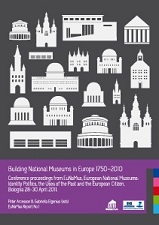 This research strand investigated the development of national museums in 37 European countries. Findings have been discussed and developed in a workshop in Stockholm and a conference in Bologna. EuNaMus Report No. 1 presents the first comprehensive overview over national museums in Europe including an outline of the basis of comparative elements and significant variables.
This research strand investigated the development of national museums in 37 European countries. Findings have been discussed and developed in a workshop in Stockholm and a conference in Bologna. EuNaMus Report No. 1 presents the first comprehensive overview over national museums in Europe including an outline of the basis of comparative elements and significant variables.
Click here to read how national museums developed in Europe as a result of parallel interactions between museum, nation and state.
This link provides a summary of a workshop in Stockholm 29-30 April 2010and the opening of Eunamus.
The following links take you to the programme of the conference in Bologna 30 March – 1 April 2011, Eunamus' blog or the conference's webpage.
_____________________________________________________
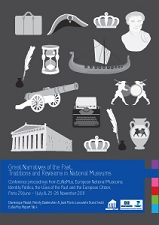 Uses of the Past: Narrating the Nation and Negotiating Conflicts
Uses of the Past: Narrating the Nation and Negotiating Conflicts
This research strand studied the overt construction of historical narratives and the museum’s role in the construction of nations and Europe. Case studies examined conflict, tension, homogenisation and commemoration. It organised one workshop and two conferences.
Click here to access conference proceedings from the two conferences in Paris 2011.
Workshop: Great Historical Narratives in European Museums (1750-2010): Building Nations, Looking across Borders and Remembering the Past. Paris June 29 - July 1 2011
Link to the programme and to Unfolding Eunamus blog from the event.
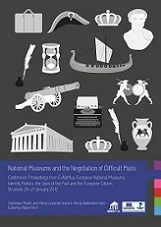 Conference: Great historical narratives in Europe’s national museums. Paris 25-26 November 2011
Conference: Great historical narratives in Europe’s national museums. Paris 25-26 November 2011
Programme and abstracts. Read the blog.
Conference: National museums and the negotiation of difficult pasts. Brussels, 26-27 January 2012
Click here for programme
Conference proceedings are available at this link
_____________________________________________________
The museology of Europe: the language of art, the local nation and the virtual Europe
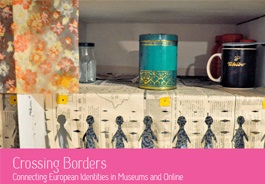 Fieldwork in eleven European cityscapes, studies of distributed national museumscapes in Norway, Britain, Sweden and Italy a well as two studies of museum-like representations on the Web are summed up in Eunamus report No 2: Crossing Borders: Connecting European Identities in Museums and Online.
Fieldwork in eleven European cityscapes, studies of distributed national museumscapes in Norway, Britain, Sweden and Italy a well as two studies of museum-like representations on the Web are summed up in Eunamus report No 2: Crossing Borders: Connecting European Identities in Museums and Online.
Findings from this research strand were presented in workshops and public lectures in Athens 23-25 April 2012. Click here to read more.
Enquiries: Simon Knell
_____________________________________________________
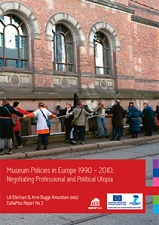 Museum policies 1990-2010: negotiating political and professional utopia
Museum policies 1990-2010: negotiating political and professional utopia
This strand of Eunamus invetsigated how nations develop policy in order to deploy national museums in national redefinition. As cornerstones of national identity, national museums define a nation’s relationship to the past, and mobilize history for both cohesive (nation building) and divisive (nation defining) purposes. In a Europe realizing the impact of globalization and mass human migration, the role of national museums is put to debate. The results from this research played a vital part in shaping Eunamus policy statements on how national museums can play a role in European social cohesion.
Click here access the report from this research strand
Findings were presented at an open conference in Oslo 27-29 June 2012. Click here to read more.
Click here to read more on the case studies in this research strand.
_____________________________________________________
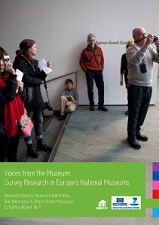 Museum citizens: audience identities and experiences
Museum citizens: audience identities and experiences
The aim of this research strand was to explore the understanding of national museums by the public. A series of case studies considered the ways in which people are active knowledge-producers of nation and citizenship and not only consumers of the museum’s messages. The data was collected through questionnaires and interviews, as well as focus groups. Findings was discussed and enhanced in a workshop in Athens in April. Click here to read more.
Click here to read Voices from the Museum: Survey Research in Europe's National Museums
.jpg) Click here to read Voices from the Museum: Qualitative Research Conducted in Europe’s National Museums
Click here to read Voices from the Museum: Qualitative Research Conducted in Europe’s National Museums
_____________________________________________________
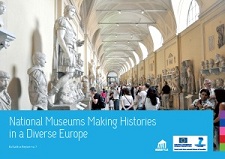 National museums, history and a changing Europe
National museums, history and a changing Europe
This research strand produced Eunamus summary policy report
Click here to read National Museums Making History in a Diverse Europe
_____________________________________________________
Project Work plan and Methodology
The methodology and associated work plan, together with a diagram of the structure of the project and the interactions between Eunamus’ thematic areas of studies (i.e work packages (WPs) can be downloaded here.

